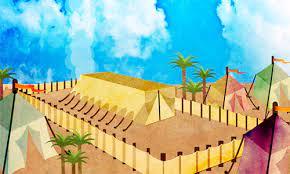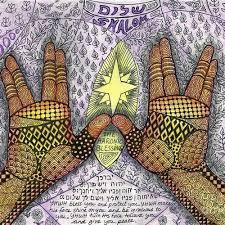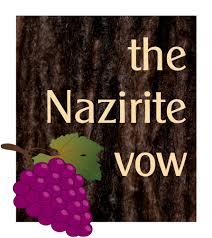Bh – The Separation of the Levites 8: 5-26
The Separation of the Levites
8: 5-26
The separation of the Levites DIG: What does it mean to be “set apart?” What were the responsibilities for the Levites? How were they set apart? How do people today get chosen and ready for spiritual service? What role has God given you in His Kingdom? Have you been faithful in what He has called you to do? How does this setting apart of the Levites compare with how the Nazirites were set apart in Chapter 6.
REFLECT: What are the dangers of becoming isolated from the real world? When we feel competitive, prideful, or shameful in our spiritual service, what can we learn from God’s choice of the priests and Levites? What role has God given you in His Kingdom? Ask the Lord to show you what role He has for you, and how to be faithful in that role. How can we keep a balance between separation and involvement?
The entire tribe of Levi was to assist the priests in their ministry.
Throughout these early chapters of Numbers there is a topical presentation rather than a chronological arrangement of the material. They have been telling us the story of the Israelite’s preparations to leave Mount Sinai. In the first four chapters of Numbers, they took a census (to see link click An – The Levitical Census) and assigned the Levites to their various tasks (see Ar – The Four Camps of Levites). Numbers 7-10 is a flashback and relates how Isra’el was ready to depart from Mount Sinai. The setting aside of the Levites (8:26) presumably followed immediately after the twelve days of gifts by the twelve tribes (see Be – Gifts of the Twelve Tribes), perhaps on the thirteenth day of the month.
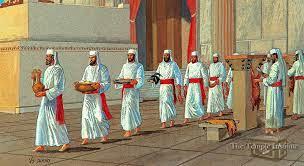
The Levites had redeemed the Israelite firstborn (see Ap – Redeeming the Firstborn) and had been assigned other duties of guarding (3:14-39) and removing (4:1-33) the Tabernacle. But before the Levite workforce is permitted to dismantle and handle the holy things, they must be ritually qualified, which requires that it be purified of impurities such as contact with the dead. This purification, however, should not be compared with the ordination ceremony of the priests (Lev 8:1-36), who were consecrated with anointing oil (see the commentary on Exodus Ge – The Dedication of Aaron and His Family), in order to gain a holy status so that they could have access to the sacred objects, that is to officiate at the bronze altar and enter the Sanctuary. The Levites, on the other hand, were forbidden to enter the Sanctuary or officiate at the bronze altar (18:3-4). Their ministry was only to assist the priests in their duties, to guard the Tabernacle, and transport it and its sacred objects after they were covered by the priests.128
These verses are displayed in a chiastic fashion (see Ac – Numbers from a Messianic Jewish Perspective: Chiasm and introversion). This section of Scripture is symmetrically balanced (AB-BA), with the singular rationale (C) placed in the center. Though the rationale is traceable to a previous source (3:9-13), a new element is added – the Levites as a ransom for the Israelites (3:19), a factor that will play a crucial role in defining the Levitical responsibilities in the Sanctuary (18:23).
A. Introduction (8:5-7a): ADONAI said to Moshe, “Now set the Levites apart from the rest of the people of Isra’el and make them ceremonially clean.” During the dedication of the bronze altar, the Levites did not bring any gifts. But here, we realize that they themselves were to be the gift. The entire tribe of Levi was to assist the priests in their ministry of the temporary covering of sin at the bronze altar.
B. Set procedure (7b-15): Their purification service began when they were sprinkled with purification water and ashes from the red heifer (see De – The Red Heifer). Then, like the leper at the outset of his purification, all their hair was shaved off of their entire body (14:8). The shaving was a purification ritual, apparently intending to insure that every inch of his flesh would be washed in the mikvah. But it may also have added significance of symbolizing the start of their term of dedication to ADONAI. We learned in the mitzvot of the Nazarite (see Ba – The Nazarite Vow) that the length of one’s hair while under a vow was indicative of the length of service one had devoted to YHVH. Most likely, Nazarites began their vows with a clean head. Perhaps a similar reason is behind the Levitical shave. It was a sign of the start of their new life of service and dedication. Finally, clean-shaven and rather newborn like, they were to wash their clothes and immerse in the mikvah.129
The sacrifices for the appointment of the Levites consisted of two bulls. Then they are to take a young bull for a burnt offering (see the commentary on Leviticus Ao – The ‘Olah Offering: Providing Access to God), with its accompanying grain offering (see Leviticus Ap – The Minhah: Assuring People of God’s Acceptance), which is to be fine flour mixed with olive oil; while you take another bull for a purification offering (see Leviticus Aq – The Chatta’th Offering: Communicating God’s Forgiveness) (8:8).
A bull was ordinarily brought only for the purification offering made on behalf of the priesthood or the whole community of Isra’el (Leviticus 4:3-20). Purification offerings made on behalf of the community, but not including the priesthood, were typically goats (the bull and goat combination of Yom Kippur represented the priesthood and the community, respectively). Why, then, were the Levites required to bring a bull for a purification offering? Wouldn’t a goat have sufficed?
To understand why the Levites required a bull for a purification offering, we must first understand the two roles that the Levites played on behalf of the community. We have already learned that the Levites were offered to God as a substitute for the firstborn of the sons of the twelve tribes. But in addition to that, the Levites were to represent all Isra’el in matters pertaining to the holy things of the Sanctuary (see 8:18-19 below). You are to present the Levites in front of the Tabernacle, and assemble the entire community of the people of Isra’el (8:9).
Because the Levites were to represent all Isra’el in their service in the Tabernacle, all Isra’el needed to lay their hands on them to transfer that corporate identity to them. You will present the Levites before ADONAI, the people of Isra’el will lay their hands on the Levites (8:10). How this actually happened is hard to imagine, it was probably done by individual leaders of the twelve tribes. But the meaning is clear. In the sacrificial system, a man or a woman laid their hands on the head of the animal they meant to sacrifice in order to transfer their identity to the animal, that it may be accepted for [the offeror] to make atonement on [the offeror’s] behalf (Leviticus 1:4). The animal sacrifice was meant to go to the bronze altar instead of the person offering it. The same principle applied to the Levites. The representatives of all the people laid their hands on the Levites, thereby transferring the identity of all Isra’el to them. Thus, the Levites could minister in the Tabernacle on behalf of the entire nation.
Since the Levites were invested with the identity of all Isra’el (including the priesthood which is, technically, a part of the Levites), a bull was required for their purification offering, for it was not only on their behalf, but on behalf of the whole nation. As a result, the representatives of the people laid their hands on the Levites, and the Levites laid their hands upon the bull.
As the Levites were presented as a gift to ADONAI on behalf of all Isra’el (see below), Aaron and Moshe were instructed to offer the Levites before ADONAI as a wave offering from the people of Isra’el, so that they qualify to do ADONAI’s service. The Levites will lay their hands on the heads of the bulls; the one you will offer as a purification offering and the other as a burnt offering to ADONAI to make atonement for the Levites. You are to place the Levites before the priesthood, Aaron and his sons, and offer them as a wave offering to ADONAI (8:11-13). A wave offering was traditionally understood to entail lifting an object before YHVH and waving it in six directions: East, South, West, North, up, and down. It is difficult to understand how Moshe and Aaron accomplished such a service with the whole tribe of Levi. Rather tongue in cheek, the Midrash Rabbah comments on the amazing strength required to wave all those Levites. “When Aaron waved the Levites, he lifted 22,000 of them in one day? How did he wave them? Forward, backwards, upwards, and downward? This proves that he was a man of great strength (Leviticus Rabbah 1:26).
We don’t know the method by which Aaron actually waved the Levites. One suspects it was a token waving on behalf of the whole tribe. We do, however, know what waving represents. As we compare the sacrificial instructions, we see a variety of items that receive waving. The gold and bronze contributed for the Tabernacle were waved (Exodus 38:24 and 29); the barley sheaf of the omer and two loaves of Shavu’ot bread were waved (Leviticus 23:11-17); the memorial portion of grain offering was waved in the ritual of the suspected adulteress (Numbers 5:25); and in every instance the priestly portions (breast and right thigh) of the peace offerings (see the commentary on Leviticus Ak – The Peace Offerings: At Peace with God) were waved. So, the items waved before ADONAI seem to be those things which were withheld from the bronze altar. In other words, the wave offering was a substitute for offering something up on the altar of sacrifice. Sacrificial elements were ordinarily withheld from the bronze altar because they were the priest’s portion of the sacrifices (see Cy – The Portion for the Levites).
This interpretation makes sense in Numbers 8. First, the Israelites laid hands upon the Levites as they would upon a sacrifice. As stated above, the Levites were designated as the sacrificial substitutes of the people. Then Aaron and Moshe waved at the Levites. They were not to be sacrificed. Instead they were to be the property of the priesthood. The Levites were withheld from the bronze altar just as the breast and right thigh of the peace offering was withheld from the altar of sacrifice. Immediately after their waving, the head of the clans of Levites (Kohath, Gershon, an Merari) would lay their hands on the two bulls which were to go to the bronze altar of sacrifice instead of the Levites. By means of that symbolic waving, the Levites were separated. In this way you will separate the Levites from the people of Isra’el, and the Levites will belong to me. After that, the Levites will enter and do the service of the tent of meeting. You will cleanse them and offer them as a wave offering (8:14-15).130
C. Rationale (8:16-19): Because they are entirely given to me from among the people of Isra’el; I have taken them for Myself in place of all those who come first out of the womb, that is, the firstborn males of the people of Isra’el. For all the firstborn among the people of Isra’el are mine, both humans and animals; on the day I struck all the firstborn in the land of Egypt, I set them apart for myself (8:16-17). But I have taken the Levites in place of all the firstborn among the people of Isra’el, and I have given the Levites as a gift to Aaron (just as believers are a gift from Yeshua to the Father as seen in John 10:29) and his sons from among the people of Isra’el to do the service of the people of Isra’el in the Tabernacle and to make atonement [as a substitute] for the people of Isra’el, so that no plague will fall on them in consequence of their coming too close to the Sanctuary” (8:18-19). As the Levites laid their hands on the sacrifices, so Isra’el laid their hands on the Levites, as if they were a living sacrifice (Romans Dc – Responding to the Mercies of ADONAI). Like the Levites, we cannot save other people, but we can lead them to our High Priest, Yeshua Messiah. In this anticipatory passage the need for the Levites to make atonement for the people (8:19) is resolved in 18:23.131
B. Set Procedure (8:20-22a): This is what Moshe, Aaron and all the community of the people of Isra’el did to the Levites. The people of Isra’el acted in accordance with everything that ADONAI had ordered Moshe in regard to the Levites. The Levites purified themselves and washed their clothes (see De – The Red Heifer). Then Aaron offered them as a holy gift before ADONAI and made atonement for them in order to cleanse them. After that, the Levites came to do their service in the Tabernacle in front of Aaron and his sons. These verses are presented in the standard structural pattern. Moses (the leader-prophet), Aaron and the Levites (the priests and their assistants), and all Isra’el (the people) are pictured in harmony as they fulfill God’s commands concerning the dedication and separation of the Levites.
A. conclusion (8:22b): They acted in accordance with ADONAI’s orders to Moshe in regard to the Levites. This verse serves two purposes: it reports the completion of the act of separation as a literary device; it also reports the obedience of the people as a mark of their initial compliance to the will and work of YHVH.132
The age of their service (8:23-36): The final section of mitzvah regarding the Levites in the book of Numbers gives the age limits for the Levitical labors. These figures have already been stated in the Levitical census of Chapter 4. However, the present passage is essential not only because it informs us that the Levite must cease from the arduous task of breaking down and setting up the Tabernacle when he reached the age of fifty, but also because it stipulates that he does not withdraw into retirement but continues to perform guard duty and teach the people, other duties of the Levites.133
ADONAI said to Moshe, “Here are instructions concerning the Levites: The rabbi’s understood that when they reach the age of twenty-five they would start their apprenticeship. Then, when they were thirty (4:3), they began performing their duties serving in the Tabernacle. Yeshua also began His ministry about thirty years old (Luke 3:23). David began to reign as king over Judah at the age of thirty (Second Samuel 5:4). And Joseph was thirty when he entered the service of Pharaoh (Genesis 41:46). And when they reach the age of fifty, they are to stop performing this work and not serve any longer. The Hebrew literally reads, “Return from the warfare of the work.” In 4:3 we learn that the Levites were to serve from thirty to age fifty. For believers today, we never stop using our spiritual gifts to build up the Church. They will assist their brothers in guarding the Tabernacle, but they themselves will not do any of the physical work. This is what you are to do with the Levites in regard to their duties.”134
Basically, the Levites worked under the supervision of the priesthood (Aaron’s sons Eleazar and Ithamar), and that the work of the priests and Levites was different. The priests functioned primarily inside the Sanctuary with the holy things and the Bronze Altar; while the Levites assisted the priests by guarding the outside of the Tabernacle from any encroachment by any Israelite in the camp, carrying the holy things on the march, teaching the people the Torah, being gatekeepers, singers, and also serving as judges in the cities of refuge. ADONAI knew that the priests would need reliable helpers who could assist them in their duties.
What we have seen from Genesis to Numbers is a narrowing selection from many to one. This took place in four stages. First, out of all nations, the nation of Isra’el, was chosen; secondly, out of the nation of Isra’el, the Levites were chosen; thirdly, out of all the Levites, the descendants of Aaron were chosen, who are to be the priests; and fourthly, out of all the priests, only one is chosen to be the high priest.135
Dear Heavenly Father, Praise You for being such an extraordinarily wonderful, loving and just Heavenly Father! Thank You also that after Messiah died and rose, You make those who love you to be Your priests. You also, as living stones, are being built up as a spiritual house – a holy priesthood to offer up spiritual sacrifices acceptable to God through Messiah Yeshua (First Peter 1:5). It is such a deep joy and pleasure to bring a sacrifice to You. Thank You for making a way that all those who love You, though they are not of the Levitical line nor have taken the Nazarite vow, can offer sacrifices up to You.
The answer to life’s trials and problems is in the focus of our heart. When we choose to praise You for how wonderful You are, it brings great joy and peace to our whole bodies! We praise You that for all eternity, those who love You will have great joy in living with You in Your eternal home of peace and joy. He shall wipe away every tear from their eyes, and death shall be no more. Nor shall there be mourning or crying or pain any longer, for the former things have passed away (Revelation 21:4). What a comfort to know that Messiah Yeshua is preparing a place in heaven to bring those who love Him. In My Father’s house there are many dwelling places. If it were not so, would I have told you that I am going to prepare a place for you? If I go and prepare a place for you, I will come again and take you to Myself, so that where I am you may also be (John 14:2-3).
It is a delight to offer You daily a sacrifice of praise. Beginning the day with thoughts of praise to you and ending our day remembering Your Almighty power and love, is a great way to fill us up with Your peace. We choose to focus on You and not on our problems. BIG PROBLEM – small God, but BIG GOD small problem – Yes! You are our Big God who is also our loving Father to whom we love to offer up many sacrifices of praise! In Messiah Yeshua’s holy Name and power of His resurrection. Amen



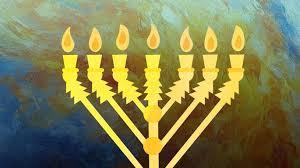
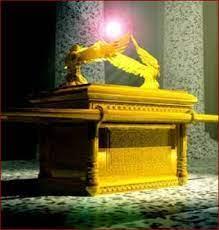

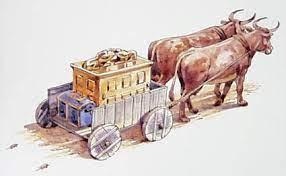 ADONAI told Moses to give them to the Levites, to each as needed for his duties. Therefore, Moshe took the wagons and oxen and gave them to the Levites. He gave two wagons and four oxen to the descendants of Gershon, in keeping with the needs of their duties. Four wagons and eight oxen he gave to the descendants of Merari, in keeping with the needs of their duties, directed by Itamar the son of Aaron the high priest. But to the descendants of Kohath he gave none (see
ADONAI told Moses to give them to the Levites, to each as needed for his duties. Therefore, Moshe took the wagons and oxen and gave them to the Levites. He gave two wagons and four oxen to the descendants of Gershon, in keeping with the needs of their duties. Four wagons and eight oxen he gave to the descendants of Merari, in keeping with the needs of their duties, directed by Itamar the son of Aaron the high priest. But to the descendants of Kohath he gave none (see 